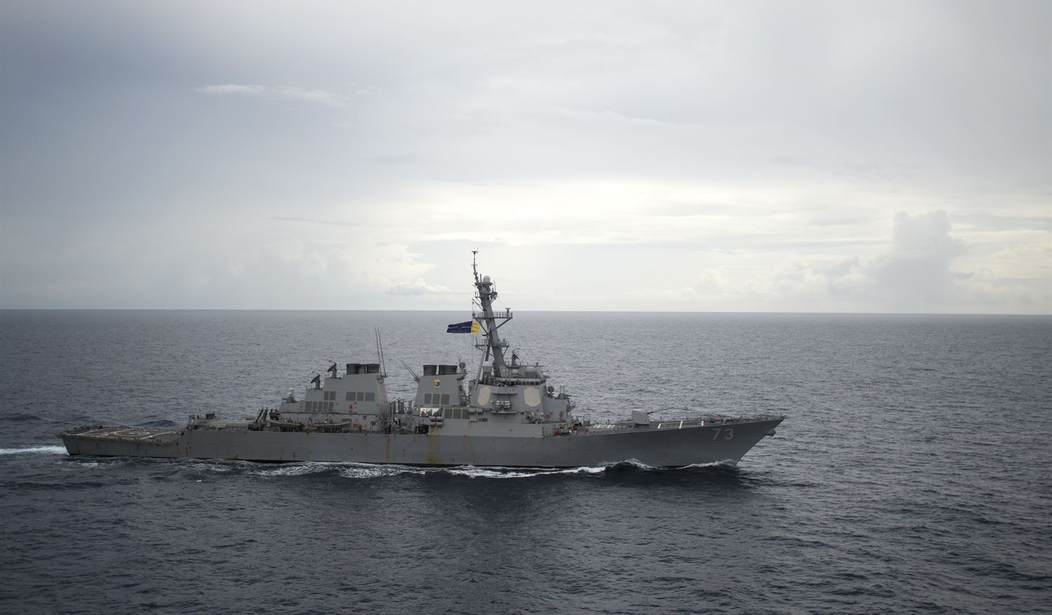What Could Go Wrong? It's Possible US Navy Will Escort Philippine Ships in South China Sea
The Chinese People's Liberation Army Navy (yes, that's really what they call it) has been acting aggressively towards Philippine shipping and fishing vessels in the South China Sea for some time now. Because of this, the United States Navy is now reportedly "open to consultations" about the possibility of using American ships to escort Philippine shipping through the contested area.
What could possibly go wrong with that?
The U.S. military is open to consultations about escorting Philippine ships in the disputed South China Sea, the head of U.S. Indo-Pacific Command said Tuesday amid a spike in hostilities between Beijing and Manila in the disputed waters.
Adm. Samuel Paparo’s remarks, which he made in response to a question during a news conference in Manila with Philippine Armed Forces chief Gen. Romeo Brawner Jr., provided a glimpse of the mindset of one of the highest American military commanders outside the U.S. mainland on a prospective operation that would risk putting U.S. Navy ships in direct collisions with those of China.
Granted the Philippines is a U.S. ally, at a time when we can use all the friendly faces in the west Pacific that we can find. We have important bases in the Philippines, which occupy a strategic location. But our ally is butting heads with China rather a lot lately:
China and the Philippines accused each other of causing a collision between their two vessels Saturday in the latest flareup of tensions over disputed waters and maritime features in the South China Sea.
In a statement posted on social media, Chinese coast guard spokesperson Liu Dejun was quoted as saying that a Philippine ship maneuvered and “deliberately collided” with a Chinese coast guard ship “in an unprofessional and dangerous manner.”
Philippine officials in Manila said it was their coast guard ship, the BRP Teresa Magbanua, that was rammed thrice by the Chinese coast guard without any provocation, causing damage to the Philippine vessel.
This is the kind of incident that we are going to be escorting Philippine shipping through. What happens when a Chinese Coast Guard captain "accidentally" bumps into a U.S. Navy frigate or destroyer?
These are the kinds of flashpoints that can start wars. And, candidly, we aren't ready for a war in the West Pacific.
Provocations: Russian, Chinese Military Aircraft Intercepted Off Alaskan Coast
That's not to say that we shouldn't stand by an ally. We have treaty obligations to consider, namely the 1951 U.S.-Philippines Mutual Defense Treaty.
But there's just a lot that can go wrong when things are this tense. China, by which we can only mean the Chinese Communist Party (CCP), has been showing increasing bellicosity in the West Pacific for quite a while. Under Chairman Xi, it is facing a host of problems; a moribund economy that they have been trying to conceal, a population that is about to walk off a demographic cliff, and a real-estate bubble in the process of bursting; this is a recipe for national leaders becoming increasingly irrational.
China is not showing aggression solely towards the Philippines, either. Japan has been the target of China's bellicosity lately too.
Granted with many of these actions China is probably, as the saying goes, testing the waters. We do the same thing, calling it the exercise of the right of passage in international waters or airspace, as the case may be. Russia does it too; every seafaring nation does these things.
But for some reason, China is pushing harder on the Philippines, perhaps because that nation's military is, unlike Japan, rather modest - but surely China knows that the United States has a mutual defense treaty with the Philippines, which makes one wonder what, at the end of the day, they are really trying to accomplish.
One wonders what General Douglas MacArthur might have said.





Post a Comment